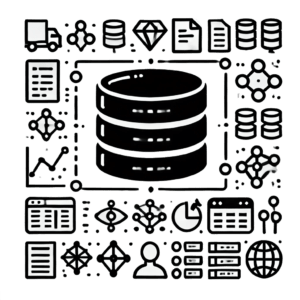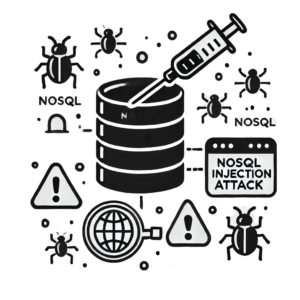Importance of NoSQL Databases
When it comes to cybersecurity, the importance of NoSQL databases cannot be overstated. As organizations increasingly rely on big data and real-time processing, NoSQL databases offer a scalable solution that traditional relational databases struggle to provide. However, with this advanced technology comes increased vulnerability to attacks, particularly NoSQL injection.
When it comes to testing how secure a system is, it’s important to be proactive in protecting NoSQL databases. It’s really important to know the possible risks and weaknesses that come with NoSQL databases so that organizations can put strong security measures in place to stop attacks before they happen. This helps keep important information safe and improves the overall cybersecurity of the organization.
It’s important for businesses that use NoSQL databases to regularly test them for weaknesses. By finding and fixing vulnerabilities before hackers can exploit them, companies can protect their data and stay safe from cyberattacks.
The Relevance of Pentesting in Injection Prevention
When it comes to securing your NoSQL databases, pentesting plays a crucial role in proactively preventing injection attacks. The threat of injection attacks, such as SQL injection, NoSQL injection, or other forms of code injection, can lead to serious security vulnerabilities if left unchecked. This is where penetration testing (pentesting) becomes invaluable in identifying and mitigating these risks.
By testing your NoSQL databases with simulated attacks, you can find weaknesses that hackers could use to steal your information. This helps you protect your data better by fixing any problems before they become a threat.
By conducting thorough penetration testing, you can strengthen the security of your databases and show that you prioritize proactive risk management and protecting your data. In the current world of constantly changing cyber threats, investing in penetration testing to prevent injections is not only a good idea but also an essential part of a strong cybersecurity plan.
Understanding NoSQL Injections
What are NoSQL Injections?
When it comes to pentesting your NoSQL databases, understanding the concept of NoSQL injections is crucial for ensuring the security of your system. NoSQL injections involve exploiting vulnerabilities in NoSQL databases to manipulate or extract sensitive data. Just like SQL injections, attackers can use malicious input to interact with the database in unexpected ways, potentially leading to data breaches and system compromises. Unlike traditional SQL databases, NoSQL databases use a different query language and data storage model, making them susceptible to unique injection attacks.
To protect your NoSQL databases from hackers, it’s important to be proactive in preventing injection attacks. This means using secure coding practices, checking and validating all input, and keeping access controls tight. Regular security checks and tests can help find and fix any weaknesses before they cause trouble. Stay updated on security news and tips to stay ahead of potential risks to your databases.
The Impact of NoSQL Injections
When it comes to safeguarding your NoSQL databases, understanding the impact of NoSQL injections is crucial in maintaining robust security measures. NoSQL injections pose a serious threat to the integrity and confidentiality of data stored within these databases. Infiltrating NoSQL databases through injections can lead to unauthorized access, data leaks, and even complete data loss, making it imperative for organizations to adopt proactive measures in preventing such security breaches.
Unlike traditional SQL databases, NoSQL databases are not immune to injection attacks. Attackers exploit vulnerabilities in input validation mechanisms to inject malicious code, manipulate queries, and tamper with data structures. The consequences of a successful NoSQL injection can be devastating, resulting in compromised data integrity, financial losses, reputational damage, and regulatory non-compliance.
To protect your data from potential hackers, it’s important for organizations to regularly test their security and have strong protocols in place. By doing this, they can reduce the likelihood of falling victim to NoSQL injections, which are a common tactic used by cybercriminals. Regular checks on database security, reviewing code, and using specific types of queries are crucial steps in keeping sensitive information safe. Additionally, an integrated approach to securing sensitive information is crucial, which includes implementing data security measures for APIs. These measures ensure that your APIs are less vulnerable to exploitation and data breaches, safeguarding the flow of information.
The Pentesting Process
Anatomy of a NoSQL Pentest
When testing the security of your NoSQL databases, it’s important to know the ins and outs of a NoSQL pentest to keep your data safe. Preventing injection attacks is key to protecting against hackers and unauthorized entry. NoSQL databases, which are prized for their flexibility and ability to grow with your needs, can be at risk for different types of attacks if they aren’t properly protected.
A successful test to make sure a NoSQL database is secure involves checking for weaknesses, testing its defenses, and reviewing its security measures. It’s important to find and fix any vulnerabilities in how the database is set up, how information is requested, and who can access it in order to stop any potential attacks.
By using common tools and methods, security professionals can test for weaknesses in systems to prevent cyberattacks. Taking steps to secure databases not only keeps sensitive information safe but also builds trust with customers and partners.
In conclusion, understanding the anatomy of a NoSQL pentest and implementing a proactive approach to injection prevention is essential for fortifying the security posture of your databases and mitigating cybersecurity risks.
Tools and Techniques in NoSQL Pentesting
When it comes to securing your NoSQL databases, a proactive approach to injection prevention is vital in safeguarding your data from potential cyber threats. As more organizations adopt NoSQL databases for their scalability and flexibility, understanding the tools and techniques for effective pentesting becomes increasingly crucial.
NoSQL pentesting involves identifying vulnerabilities in the database system, understanding attack vectors, and utilizing specialized tools to simulate real-world attacks. Tools such as NoSQLMap, Nosql Exploitation Framework (NEF), and Mongoaudit are commonly used by cybersecurity professionals to assess the security posture of NoSQL databases.
Cyberattacks like injection attacks can sneak into databases and mess with how they work, which is a big problem for NoSQL databases. To stay ahead of these threats, companies can use a mix of automatic tools and hands-on tests to uncover and fix any weaknesses before bad guys can take advantage of them.
By keeping up-to-date on the newest tools and strategies in NoSQL security testing, companies can stay a step ahead in strengthening their database security and safeguarding sensitive information from potential attacks.
The Role of Proactivity in Injection Prevention
When testing the security of your NoSQL databases, it’s important to be proactive in preventing attacks. This means taking steps to identify and fix any potential vulnerabilities that could be exploited to access your data without permission. By being proactive, you can lower the risk of data breaches and unauthorized access to your database.
Being proactive in preventing injections involves regularly checking the security of your database system, scanning for any vulnerabilities, and testing to find and fix weaknesses. By staying on top of potential threats, you can make your defense stronger and keep your data safe from hackers.
Implementing strict security protocols, such as input validation, parameterized queries, and secure coding practices, can help prevent injection attacks before they happen. Educating your team on best security practices and maintaining up-to-date security measures are also essential components of a proactive approach to injection prevention.
By prioritizing proactivity in injection prevention, you can enhance the security posture of your NoSQL databases and safeguard your organization’s sensitive information from cyber threats and data breaches.
Future Trends in Pentesting and NoSQL Security
In the ever-changing world of cybersecurity, it’s important to stay ahead of new threats. Many companies are now using NoSQL databases to store a lot of data, so it’s vital to make sure these databases are secure. This guide, “Pentesting Your NoSQL Databases: A Proactive Approach to Injection Prevention,” explains why it’s important to regularly test these databases to protect them from attacks.
One future trend in penetration testing for NoSQL security is the integration of machine learning and artificial intelligence algorithms to bolster defense mechanisms. By leveraging these advanced technologies, cybersecurity professionals can identify potential vulnerabilities and predict potential attack vectors, allowing for proactive mitigation strategies.
Furthermore, regularly checking and auditing the security of NoSQL databases is crucial for keeping them safe. As cyber threats continue to increase, it’s important to be proactive in testing security measures to protect against attacks.
